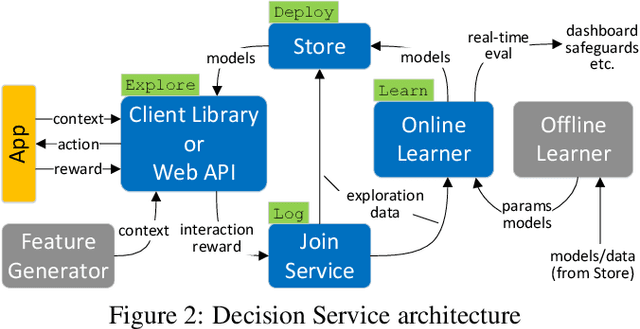Sarah Bird
A Framework for Automated Measurement of Responsible AI Harms in Generative AI Applications
Oct 26, 2023



Abstract:We present a framework for the automated measurement of responsible AI (RAI) metrics for large language models (LLMs) and associated products and services. Our framework for automatically measuring harms from LLMs builds on existing technical and sociotechnical expertise and leverages the capabilities of state-of-the-art LLMs, such as GPT-4. We use this framework to run through several case studies investigating how different LLMs may violate a range of RAI-related principles. The framework may be employed alongside domain-specific sociotechnical expertise to create measurements for new harm areas in the future. By implementing this framework, we aim to enable more advanced harm measurement efforts and further the responsible use of LLMs.
SysML: The New Frontier of Machine Learning Systems
May 01, 2019Abstract:Machine learning (ML) techniques are enjoying rapidly increasing adoption. However, designing and implementing the systems that support ML models in real-world deployments remains a significant obstacle, in large part due to the radically different development and deployment profile of modern ML methods, and the range of practical concerns that come with broader adoption. We propose to foster a new systems machine learning research community at the intersection of the traditional systems and ML communities, focused on topics such as hardware systems for ML, software systems for ML, and ML optimized for metrics beyond predictive accuracy. To do this, we describe a new conference, SysML, that explicitly targets research at the intersection of systems and machine learning with a program committee split evenly between experts in systems and ML, and an explicit focus on topics at the intersection of the two.
Abstractions for AI-Based User Interfaces and Systems
Sep 14, 2017Abstract:Novel user interfaces based on artificial intelligence, such as natural-language agents, present new categories of engineering challenges. These systems need to cope with uncertainty and ambiguity, interface with machine learning algorithms, and compose information from multiple users to make decisions. We propose to treat these challenges as language-design problems. We describe three programming language abstractions for three core problems in intelligent system design. First, hypothetical worlds support nondeterministic search over spaces of alternative actions. Second, a feature type system abstracts the interaction between applications and learning algorithms. Finally, constructs for collaborative execution extend hypothetical worlds across multiple machines while controlling access to private data. We envision these features as first steps toward a complete language for implementing AI-based interfaces and applications.
Making Contextual Decisions with Low Technical Debt
May 09, 2017



Abstract:Applications and systems are constantly faced with decisions that require picking from a set of actions based on contextual information. Reinforcement-based learning algorithms such as contextual bandits can be very effective in these settings, but applying them in practice is fraught with technical debt, and no general system exists that supports them completely. We address this and create the first general system for contextual learning, called the Decision Service. Existing systems often suffer from technical debt that arises from issues like incorrect data collection and weak debuggability, issues we systematically address through our ML methodology and system abstractions. The Decision Service enables all aspects of contextual bandit learning using four system abstractions which connect together in a loop: explore (the decision space), log, learn, and deploy. Notably, our new explore and log abstractions ensure the system produces correct, unbiased data, which our learner uses for online learning and to enable real-time safeguards, all in a fully reproducible manner. The Decision Service has a simple user interface and works with a variety of applications: we present two live production deployments for content recommendation that achieved click-through improvements of 25-30%, another with 18% revenue lift in the landing page, and ongoing applications in tech support and machine failure handling. The service makes real-time decisions and learns continuously and scalably, while significantly lowering technical debt.
 Add to Chrome
Add to Chrome Add to Firefox
Add to Firefox Add to Edge
Add to Edge